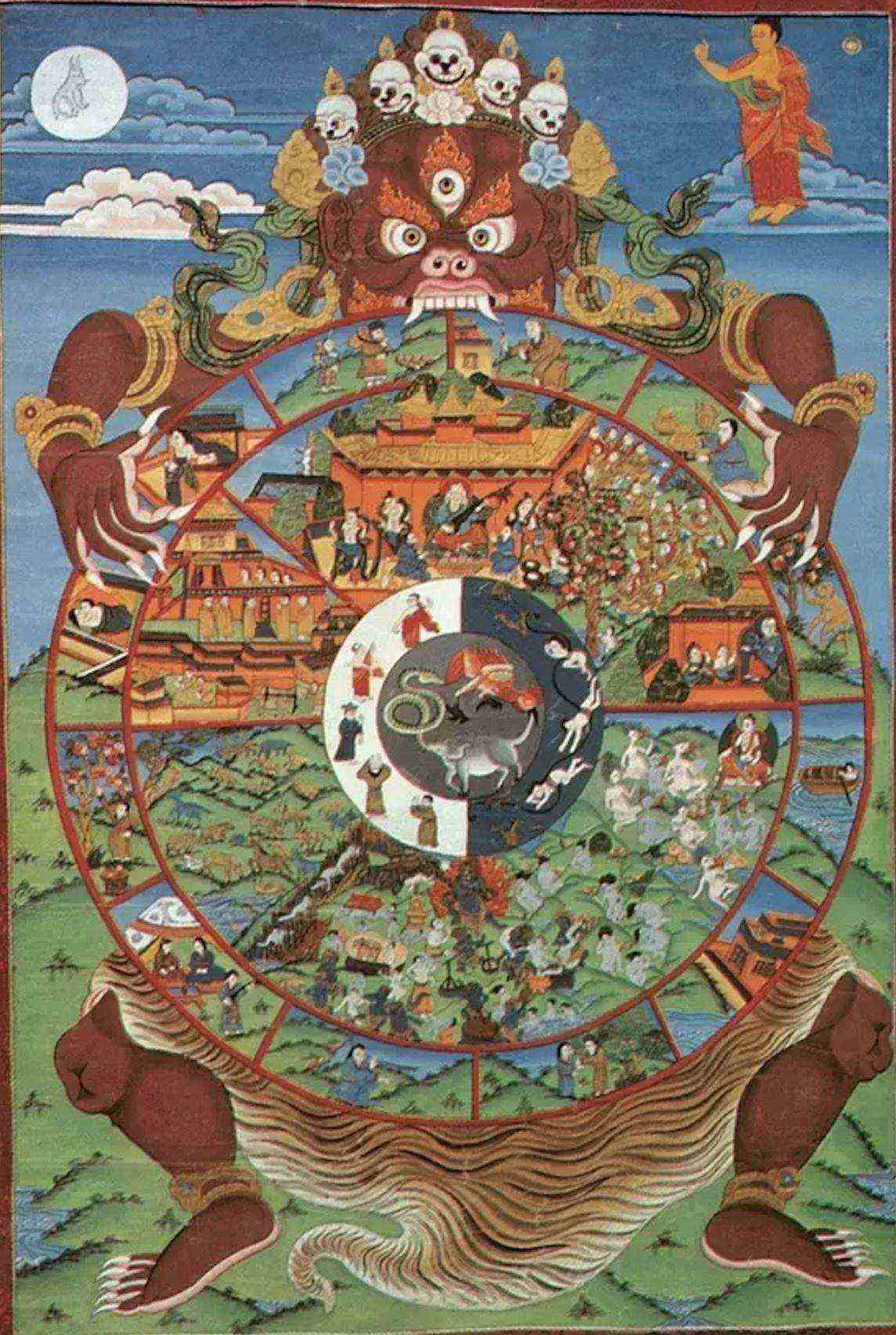
If one fails to eliminate attachment and ego-clinging and to attain Arahatship, afflictions and habitual tendencies stemming from the notion of "I" and "mine" are connected to the mind that functions at the moment of death, which will inevitably bring forth the mind that causes the next transmigratory existence to happen. When there is a cause, there will be an effect, a similar type of reasoning that examines that when chasing after the first cause, we will only discover another cause before the current one; hence, endless beginnings or beginningless.
If one fails to eliminate attachment and ego-clinging and to attain Arahatship, the mind will always think that there is a subject that exists; hence, the mind will misinterpret that it is "I" that perceives. As a result, ego-clinging emerges; and because of that, the body will come into being.
For example, when we fall asleep at night, base consciousness and ego-clinging are still there but obscured by the mental factor of drowsiness. When we wake up, we can feel the body again. Although we do not mentally conceptualize "I" at this point, we feel that, deep down, there is something inexplicit and beyond our examination; nonetheless, we still think that "I" is functioning.
Whether we think it or not, the sense of "I" is still doing its own stuff. Whether we call it "I" is another thing, but "I" is independent of everything and wants to be the master of everything. Let us say it wants the body to move from left to right, and it will do everything to make sure that the body does it. If the body moves opposite, the sense of "I" feels confined and hurt. It feels that way because the sense of "I-control-everything" is confronted. Why does it feel the confrontation? As long as there is the sense of "I-control-everything", the agenda of putting everything under its control is switched on. And the most basic part of the agenda is to control its own body. Therefore, as long as ego-clinging is there, suffering comes alone.
A new form of transmigratory existence will inevitably be brought forth if ego-clinging is not eliminated before we depart this life. It is hard to tell what the form of the new transmigratory existence will be. It could be a miserable being in hell, a hungry ghost, an animal, or a human being. Of course, if we do good things while living, we might be reborn as a deva, a heavenly being. The point is that before ego-clinging is eliminated, transmigratory existence will be there forever.
When causes and conditions are met, an effect will be yielded. This is similar to the analytical reasoning we have done previously, through which we know that, when tracing the first cause that started everything, there have been endless causes before the current cause. Hence, there is no so-called first cause. Ego-clinging, as the root cause, gives rise to the dualistic tendency of discriminating the apprehender from the apprehended and the controller from the controlled. The controller is our individualized subjective minds, and the controlled is those external objects around us. Let me give an example. We tend to think that to drink the cup of water before us, "I", the controller within us, uses the body to do it. If not, there is no way that we can make drinking happen. Therefore, the strong sense of "I-control-everything" makes us involuntarily feel we are the controller. In other words, "I" is the controller behind the scenes, and drinking the water is the result that "I" deserves.
If ego-clinging is not eliminated, the obscured mind will involuntarily separate the perceiver from the perceived, which, also known as the dualistic mind, the most powerful habitual tendency, is impossible to eliminate without Buddhist practice engaged. Unless the obscured mind goes back to illumination, the primordial state of mind, going with the flow, and is free from the sense of "I-control-everything", endless forms of transmigratory existence will come one after another. This strong sense of "I-control-everything" that obscures the mind will not disappear simply because the universe disappears. It is ready to do its work anytime, anywhere. The moment it starts working, karmic seeds, or potentialities, begin to sprout. Different karmic seeds bring forth different worlds and different physical bodies. This karmic circulation is so-called causality. The physical bodies formed by the karmic seeds are called the core outcome, and environments and circumstances that come along with the physical bodies are called the contingent outcome.
Even though you do not want to be liberated from this cyclic existence, it is extremely beneficial to plant good karmic seeds in your mind. What goes around comes around. Good karmic seeds will ensure that you will have a reward instead of retribution. For example, young dharma practitioners who have learned the offering-making practice, giving-out practice, and Bodhicitta practice will enjoy a better life when they are getting old because these practices plant good karmic seeds in their minds; as a result, favorable conditions naturally bring forth joyful and pleasant living environment for them. Particularly, when a person practices Bodhicitta for a long time, his body and mind will feel settled and comfortable. No matter what situation he is in, he is lighthearted and happy. And the truth is that he rarely encounters unfavorable surroundings because of the Bodhicitta practice.
Bodhicitta, the stepping stone of Mahayana Buddhists, is an altruistic attitude that solely works for the liberation of all sentient beings from cyclic existence until they reach the Buddhahood. Therefore, for anyone who wants to genuinely follow the Mahayana path, Bodhicitta is one of the must-haves. Unfortunately, deep down, many of us, so-called dharma practitioners, do not believe it, let alone develop it. What drives us to practice Buddhadharma is to gain a sort of supernatural power, which many will not admit, but it is a hidden agenda for them. Though disguised, this mentality tells that whoever has it does not have Renunciation and Bodhicitta, not even remotely. All he wants is to use supernatural power to impress people and gain all sorts of benefits. This mentality is so greedy that only those beings in the realm of hungry ghosts have. Anyone with this kind of mentality, in terms of practicing Buddhadharma, does not go anywhere. Therefore, it is vital that we constantly observe the motivation for practicing Buddhadharma. You will not go after supernatural power if you genuinely practice Buddhadharma with Bodhicitta. All you do is to see whether you really have Bodhicitta. Once you have it, supernature power will naturally come along as a byproduct.
Once I asked Khenpo Cheme Renzin, "What is the greatest supernatural power?" Khenpo answered without any hesitation: "Bodhicitta! Bodhicitta is the greatest supernatural power." So, while practicing Buddhadahrma, we must observe ourselves and be clear about our motivations and purposes to see if they align with Bodhicitta. Some of our hidden agendas are very bad and entirely against Bodhicitta. Since we have such evil agendas, we will act accordingly. Fundamentally speaking, our Buddhist practices will make us better by gradually cultivating those must-have qualities, such as loving-heartedness, Bodhicitta, and the mind with clarity, lucidity, and stability, that a good practitioner has. If not, we will, conscious or not, become a troublemaker for ourselves and others around us. This is why we see so many bitter quarrels and conflicts in and between Buddhist communities. Part of the reason is that we, as beginners on this spiritual path, have neither the righteous motivation nor the ability to examine our minds clearly and accurately.
In most cases, since we are swayed by our habitual tendencies and unable to see ourselves and others clearly, wherever we go, conflicts follow. So, what should we do? We need to examine ourselves and control our behaviors and words to not hurt others and create chaos. Moreover, in light of the same reason, we forgive others if they hurt us. It is not their fault. They are just puppets of their habitual tendencies. Unless everyone has practiced Buddhadharma in their previous lives, meaning they are experienced practitioners, we do not expect everyone to be free of shortcomings and condemn them for not doing things we expected.
Everyone starts this spiritual journey on the same footing ––– the mind of ignorance, which drives us to think, talk and act self-centeredly without even being aware of it. This sense of self-centeredness does nothing good for us but only creates more chaos. We reap what we sow. The only thing we reap with self-centeredness is suffering. So, what do we do in this case? We gradually transform our lousy minds through the step-by-step accumulation of merits and purification of obscurations. According to the law of causality, there will be an outcome for sure whenever causes and conditions are met, good or bad. If a melon's seed (cause) is sowed and the four elements (conditions) ––– earth, fire, water, and wind ––– are met, will there be a melon? Of course, there will be. Things appear not because they are created by an objective spirit like God. ""God said, Let there be light; and there was light."" However, as a matter of fact, to have light, its causes and conditions must be met first. What does it mean? When different aspects of the mind come together, phenomena will appear upon the mind.
Therefore, the mind that appears, lasts, and disappears in the first moment brings forth the mind that appears in the following moment. We know this directly without the analytical reasoning involved. Day and night, from birth to death, the mind never stops appearing and disappearing.
It is obvious to know, from the moment we wake up in the morning till the moment we fall asleep at night, if the mind stops functioning just for a single moment, no matter how short it is, we die for sure. The notion that the mind stops functioning during sleep is wrong. The mind functions even during sleep. Otherwise, blood circulation would stop. During sleep, all six sense organs stop functioning. The body does not sense anything. Ears do not hear anything. Eyes do not see anything. However, heart still beat. Why? Because the mind makes it pump. If no such subtle movement occurs, the mind will die out completely. There is no way that we can wake up in the morning. What makes you wake up? It is the mind that does the job. Waking up means that the mind in the last moment fell asleep.
The mind never ends, which, in other words, means it will never be absent from the scene at all. Not perceiving a thing does not necessarily mean it does not exist. If it does not exist, it does not appear anymore. For example, I am pondering over something. Before I figure it out, I fall asleep. When I wake up, I continue to ponder over it. In between these two times, there is a break-off. What links them up is the mind that does the trick. That is why Cittamatra states, as a validation of its doctrine, that there is a continuum of the mind. Consequently, there are the defiled mental consciousness and Alayavaijnana. If they are not there and the six sense organs stop functioning, what would happen when a person falls asleep in this scenario? He will never wake up again. Therefore, there must be the defiled mental consciousness to connect things between times. Though the six sense organs stop functioning during sleep, the karmic seeds they have accumulated are stored intact in Alayavijnana. When the faculty of drowsiness fades out, the defiled mental consciousness relinks the karmic seeds of the six sense organs. The mind does not need to carry out logical reasoning to figure out whether it is a morning or evening mind. It naturally relinks everything between times, moment by moment, by serving as a bridge or a bond. Although thoughts are numerous and weird, the "I" is the thing that does the thinking, feeling, and sensing. Therefore, in this case, the "I" is called the continuum of the mind. We need to be clear about one thing. The continuum does not mean what we think between times is the same thing. Not at all.
If we recognize selflessness, the obscured mind will never arise again because the condition for it to arise is no longer there. It is like when the wheat seeds are burned, even if the other conditions (soil, water, temperature, and wind) are met, we will never see the wheat growing out of the soil. So likewise, before dying, if we realize the two types of selflessness, the substantial cause that brings forth the cyclic existence will disappear, and the root of all impure karmas and afflictive emotions will be eliminated for good; hence, the obscured mind will never arise.




